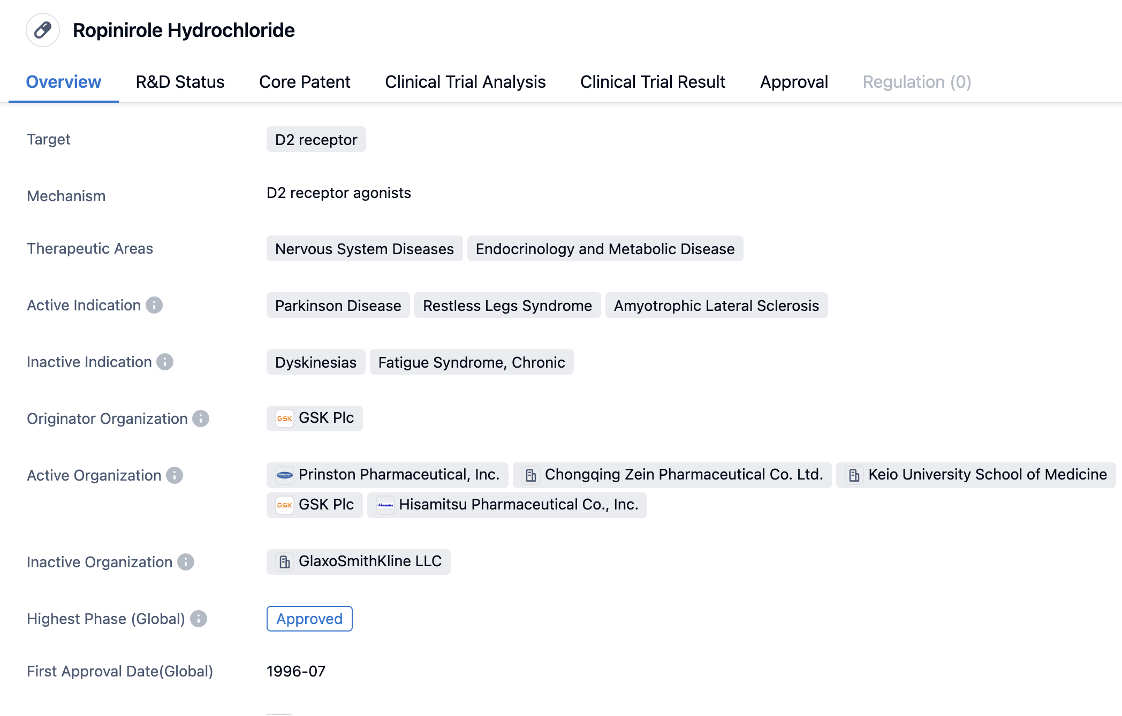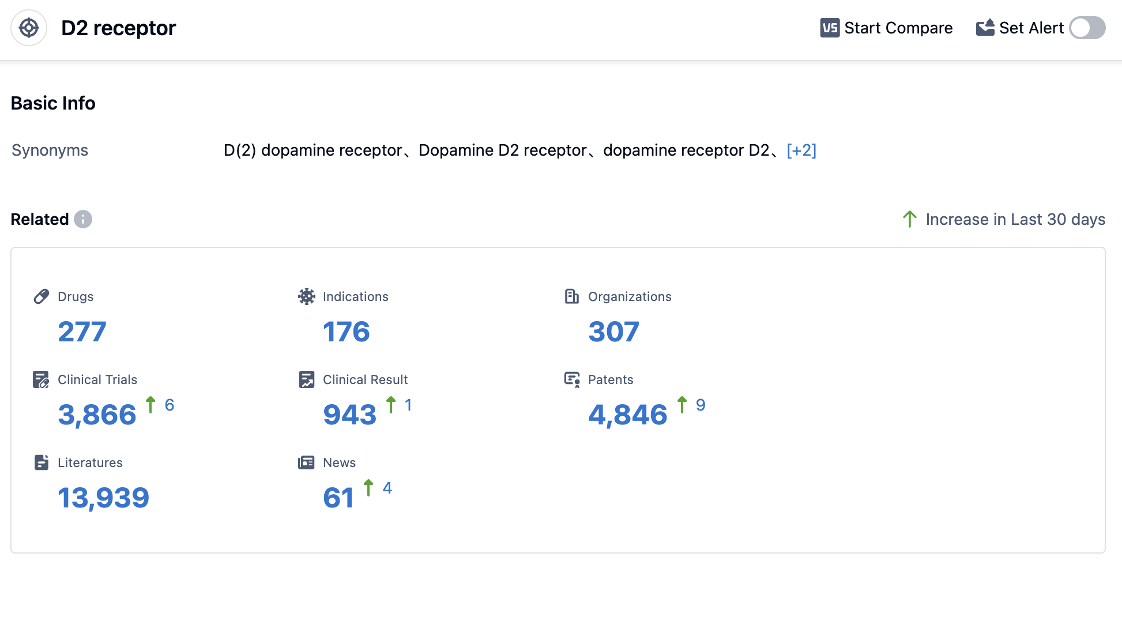An In-depth Analysis of Ropinirole's R&D Progress and Mechanism of Action on Drug Targets
Ropinirole's R&D Progress
Ropinirole is a small molecule drug that primarily targets the D2 receptor. It is used in the treatment of various nervous system diseases and endocrinology and metabolic diseases. The drug has been approved for the treatment of Parkinson's disease, restless legs syndrome, and amyotrophic lateral sclerosis.
According to the data provided by Patsnap Synapse-Global Drug Intelligence Database: the originator organization of Ropinirole Hydrochloride is GSK, a renowned pharmaceutical company. Its first approval was granted in July 1996 in the United Kingdom.
Ropinirole Hydrochloride is primarily used in the management of Parkinson's disease, a neurodegenerative disorder that affect movement. It helps to alleviate the symptoms of the disease, such as tremors, stiffness, and impaired balance. The drug works by stimulating the D2 receptors in the brain, which helps to regulate the levels of dopamine, a neurotransmitter involved in motor control.
👇Please click on the image below to directly access the latest data (R&D Status | Core Patent | Clinical Trial | Approval status in Global countries) of this drug.

In addition to Parkinson's disease, Ropinirole Hydrochloride is also indicated for the treatment of restless legs syndrome. This condition is characterized by an irresistible urge to move the legs, often accompanied by uncomfortable sensations. The drug helps to reduce these symptoms and improve sleep quality for individuals suffering from this disorder.
Furthermore, Ropinirole Hydrochloride has shown potential in the treatment of amyotrophic lateral sclerosis (ALS), a progressive neurodegenerative disease that affect nerve cells responsible for muscle control. While the drug does not cure ALS, it may help manage symptoms such as muscle stiffness and spasms, improving the quality of life for patients.
Mechanism of Action for Ropinirole
Ropinirole, a nonergoline dopamine agonist, binds to dopamine D2-like receptors. D2 receptor agonists are a type of medication that bind to and activate the D2 receptors in the brain. D2 receptors are a subtype of dopamine receptors, which are involved in regulating various functions in the central nervous system. By acting as agonists, these medications mimic the effects of dopamine on the D2 receptors.
From a biomedical perspective, D2 receptor agonists are commonly used in the treatment of certain neurological and psychiatric conditions. They can be used to manage symptoms of Parkinson's disease, as dopamine deficiency is a characteristic feature of this condition. By stimulating the D2 receptors, these medications help to restore dopamine levels and improve motor symptoms such as tremors, rigidity, and bradykinesia.
In addition to Parkinson's disease, D2 receptor agonists may also be prescribed for other conditions such as restless legs syndrome and certain psychiatric disorders like schizophrenia. By targeting the D2 receptors, these medications can modulate dopamine signaling and help alleviate symptoms associated with these conditions.
It's important to note that the use of D2 receptor agonists should be done under the supervision of a healthcare professional, as they can have potential side effects and interactions with other medications. The specific choice of D2 receptor agonist and dosage will depend on the individual's condition and response to treatment.
Drug Target R&D Development for Ropinirole
The drug target of Ropinirole is D2 receptor. The D2 receptor is a type of dopamine receptor found in the human body. It plays a crucial role in various physiological and neurological processes. As a G-protein coupled receptor, the D2 receptor is involved in the regulation of dopamine neurotransmission, which affects mood, motivation, and reward. Dysfunction of the D2 receptor has been implicated in several psychiatric disorders, including schizophrenia and addiction. Additionally, the D2 receptor is a target for antipsychotic medications, which work by blocking its activity to alleviate symptoms associated with psychosis. Understanding the role of the D2 receptor is essential for developing therapeutic interventions for psychiatric and neurological conditions.
According to Patsnap Synapse, as of 30 Aug 2023, there are a total of 277 D2 receptor drugs worldwide, from 307 organizations, covering 176 indications, and conducting 3866 clinical trials.
👇Please click on the picture link below for free registration or login directly if you have freemium accounts, you can browse the latest research progress on drugs , indications, organizations, clinical trials, clinical results, and drug patents related to this target.
Conclusion
Overall, Ropinirole Hydrochloride is a small molecule drug developed by GSK that targets the D2 receptor. It has been approved for the treatment of Parkinson's disease, restless legs syndrome, and shows promise in managing symptoms of amyotrophic lateral sclerosis. Its approval in multiple countries, including China, highlights its global significance in the field of biomedicine.




